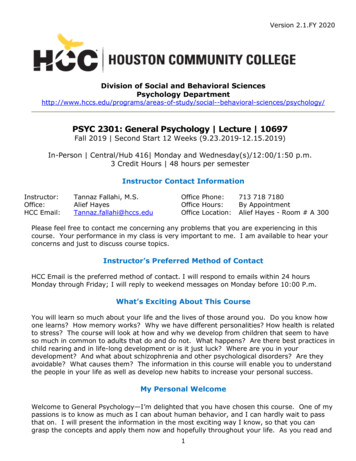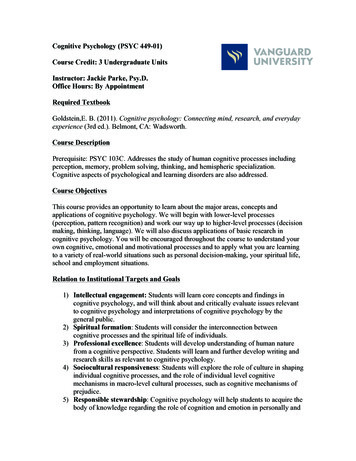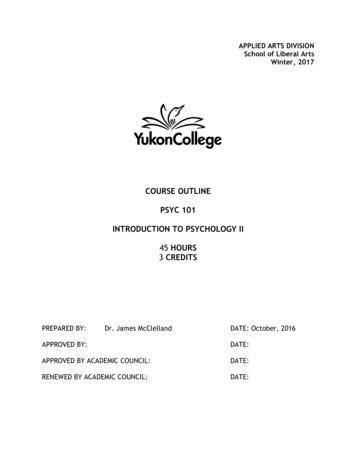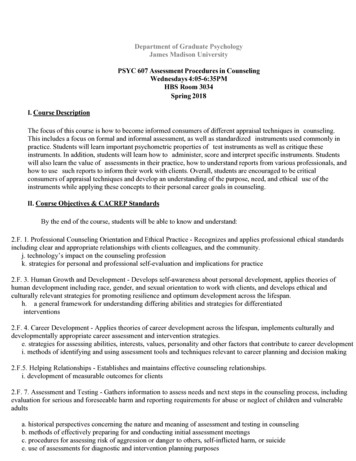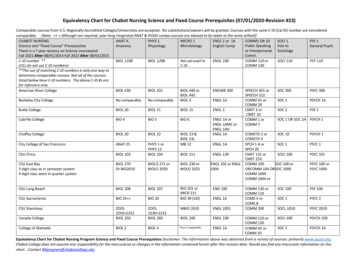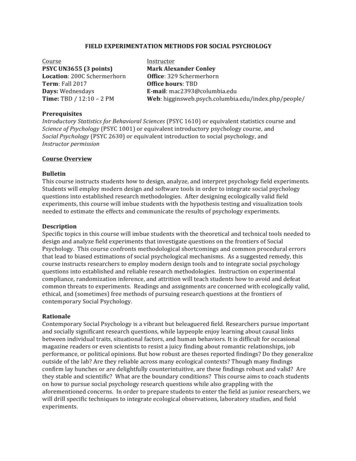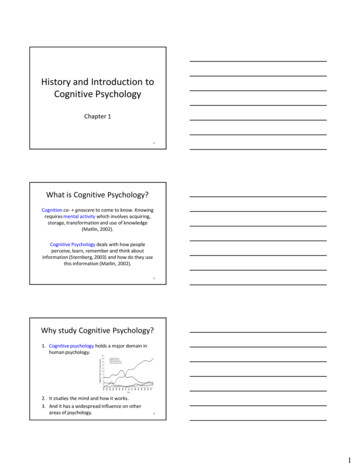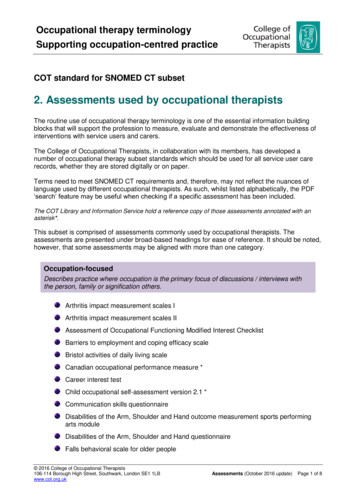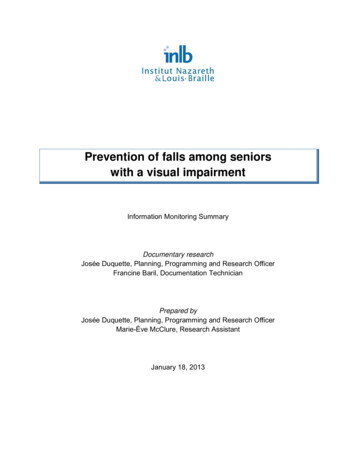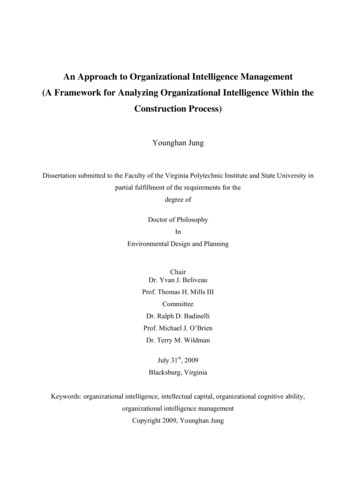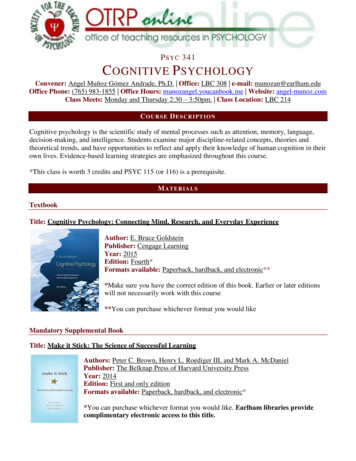
Transcription
P SY C 341C OGNITIVE P SYC HOLOGYConvener: Angel Muñoz Gómez Andrade, Ph.D. Office: LBC 308 e-mail: munozan@earlham.eduOffice Phone: (765) 983-1855 Office Hours: munozangel.youcanbook.me Website: angel-munoz.comClass Meets: Monday and Thursday 2:30 – 3:50pm. Class Location: LBC 214C O U R S E D E S C R I PT I O NCognitive psychology is the scientific study of mental processes such as attention, memory, language,decision-making, and intelligence. Students examine major discipline-related concepts, theories andtheoretical trends, and have opportunities to reflect and apply their knowledge of human cognition in theirown lives. Evidence-based learning strategies are emphasized throughout this course.*This class is worth 3 credits and PSYC 115 (or 116) is a prerequisite.MATE RIALSTextbookTitle: Cognitive Psychology: Connecting Mind, Research, and Everyday ExperienceAuthor: E. Bruce GoldsteinPublisher: Cengage LearningYear: 2015Edition: Fourth*Formats available: Paperback, hardback, and electronic***Make sure you have the correct edition of this book. Earlier or later editionswill not necessarily work with this course**You can purchase whichever format you would likeMandatory Supplemental BookTitle: Make it Stick: The Science of Successful LearningAuthors: Peter C. Brown, Henry L. Roediger III, and Mark A. McDanielPublisher: The Belknap Press of Harvard University PressYear: 2014Edition: First and only editionFormats available: Paperback, hardback, and electronic**You can purchase whichever format you would like. Earlham libraries providecomplimentary electronic access to this title.
Canonical and other important readings in cognition (optional readings!)Colflesh, G. J. H. & Conway, A. R. A. (2007). Individual differences in working memory capacity anddivided attention in dichotic listening. Psychonomic Bulletin & Review, 14, 699-703Collins, A. M., & Loftus, E. F. (1975). A spreading-activation theory of semantic processing. PsychologicalReview, 82, 407-428.Cowan, N. (2000). The magical number 4 in short-term memory: A reconsideration of mental storagecapacity. Behavioral and Brain Sciences, 24, 87-185.Firestone, C., & Scholl B. J. (2016). Cognition does not affect perception: Evaluating the evidence for “topdown” effects. Behavioral and Brain Sciences, 39, 1-77.Goldfarf, L., & Triesman, A. (2010). Are some features easier to bind than others? The congruency effect.Psychological Science, 21, 676-681.Graf, P. (2012). Prospective memory: Faulty brain, flaky person. Canadian Psychology, 53, 7-13.Jay. T. (2009). The utility and ubiquity of taboo words. Perspectives on Psychological Science, 4, 153-161.Maeda, Y., & Yoon, S. Y. (2012). A meta-analysis on gender differences in mental rotation ability measuredby the Purdue spatial visualization tests: Visualization of rotations (PSVT:R). EducationalPsychology Review, 25, 69-94.McClelland, J. L. (1994). The organization of memory: A parallel distributed perspective. Rev. Neurol.,150, 570-579.Miller, G. A. (1955). The magical number seven, plus or minus two: some limits on our capacity forprocessing information. Psychological Review, 101, 342-352.Miller, G. A. (2003). The cognitive revolution: A historical perspective. Trends in cognitive sciences, 7,141-144.Morsanyi, K., & Holyoak, K. J. (2010). Analogical reasoning ability in autistic and typically developingchildren. Developmental Science, 13, 578-587.Pashler, H., McDaniel, M. A., Rohrer, D., & Bjork, R. (2008). Learning styles: Concepts and evidence.Psychological Science, 9, 105-119.Roediger, H. L., & Karpicke, J. D. (2006). Test-enhanced learning: Taking memory tests improves longterm retention. Psychological Science, 17, 249-255.Shaw, R. (2002). Theoretical hubris and the willingness to be radical: An open letter to James J. Gibson.Ecological Psychology, 14, 235-247.Simmons, D. J. (2000). Attentional capture and inattentional blindness. Trends in Cognitive Sciences, 4,147-155.Spearling, G. (1960). The information available in brief visual presentations. Psychological Monographs:General and Applied, 74(11), 1-29Westfall, J. E., Jasper, J. D., & Christian, S. (2012). Inaction inertia, the sunk cost effect, and handedness:Avoid the losses of past decisions. Brain and Cognition, 80, 192-200.2 Page
COURSE GOALSLearn an overview of cognitive psychology (1)You will leave this course with general knowledge of classic and contemporary theories of cognitivepsychology. In other words, you will obtain knowledge of major concepts, theoretical perspectives, empiricalfindings, and historical trends in cognitive psychology. Fulfills departmental Goal 1: knowledge base inpsychology.Develop a scientific mindset (2)You will critically examine the assigned readings and lecture concepts. You will also practice your abilityto understand how studies are conducted and how data is collected, analyzed, and interpreted. This is animportant skill to develop because one way to validate concepts and ideas in cognitive psychology (andthe field psychology as a whole) is through data collection, hypothesis testing, and experimentation.Fulfills Earlham goal Investigate and departmental Goal 2: Scientific Inquiry and Critical ThinkingDevelop a differential and integrative mindset (3)We will examine cognitive processes from multiple approaches and perspectives. No single approach orperspective is yet sufficient to explain the complexity of human cognition. While sometimes differentapproaches might offer conflicting views on a given topic, some other times these approaches integrateand offer a more complete picture. You will be asked in class, exams, and assignments to determine whenand why either conflict or integration (or both) occur. Fulfills Earlham goal Integrate and departmentalGoal 2: Scientific Inquiry and Critical ThinkingApply knowledge of cognition to the world and everyday life (4)This course will regularly emphasize the connection between the material covered in class, readings, andeveryday life. There will be multiple assignments and exam questions that will require you to think howyou would apply multiple theories, concepts, and findings to real world problems and your everyday life.Fulfills Earlham Goal ApplyTo develop an independent mind (5)In addition to understanding how scholars use and examine concepts within the domain of motivationscience, you will be required to think independently. What does it mean to think independently? It meansthat you should examine the facts of reality that give rise to the concepts and ideas that will be presentedin this class. It also means that you should explore and question how scholars arrived at a particular idea,concept, or definition. Remember that scholars are also fallible human beings and that knowledge shouldnever be taken on authority. Think for yourself and explore the world independently. Fulfills Earlhamgoal Reflect and departmental Goal 2: Scientific Inquiry and Critical Thinking.Using tests as a way to learn (6)My course is extremely test heavy and for a good reason. Cognitive psychology research has shown that,under most circumstances, retrieval-based learning (i.e., testing!) allows you to retain information muchlonger than, for example, passively reading a book or listening to a lecture. Additionally, answeringhigher quality questions will help you analyze, integrate, and apply the concepts you will learn in thisclass. Not only will you have the opportunity to be quizzed frequently; you will also have the chance tocreate your own quizzes from time to time. Being able to create and answer good quality questions willelevate your learning skills to the next level. Fulfills Earlham goal Create.Notes. These goals are numbered from one to six to facilitate subsequent identification within thissyllabus. For instance, grading categories (under the grading section below), will explicitly state whichgoals they are fulfilling by alluding to the above numbers. Departmental goals are consistent withAmerican Psychological Association’s Guidelines for the Undergraduate Psychology Major.3 Page
GRADINGExamsReaction PapersOnline QuizzesClassworkTotalA AA- 99-100% B 93-98% B 90-92% B-60%15%15%10%100% 87-89% C 77-79% D 66-69% 83-86% C 73-76% D 63-69% F 60% and below 80-82% C- 70-72% D- 60-62%I will round you up to the next letter if your grades are 89.96, 79.96, 69.96, or 59.96 (or above).Exams, 60% of your grade (fulfills goals 1-6)There will be a total of four exams, and each will be worth 100 points. About half of the questions will bemultiple choice and the rest will be short answer and essay questions. I will drop your lowest score fromthese exams, so only three will count towards your final grade. This is because I personally do not likedeciding what constitutes an emergency or a serious illness that will merit to take a make-up exam. SinceI am dropping one score, I will only consider make-up exams for athletic competitions (not practice!)and official college events.Exams 2, 3, and 4 are selectively cumulative. This means that you will be asked to review a small amountof the content that you already studied when preparing for an earlier exam. I do this to prevent forgettingimportant concepts and ideas. Most people forget the information they study right after taking the exam!Don’t feel bad if this happens to you, this is how memory works. Once you fulfill a goal, informationrelated to it begins to be forgotten. I will make sure to bring important and recently forgotten informationback to your awareness. I will let you know what to study from previous exams, so this will not be asurprise.Reaction Papers for Make it Stick chapters, 15% of your grade (fulfills goals 1-4)You will write seven short reaction papers in this class. The reaction papers will only be two pages longand double spaced (APA format). You will be given specific instructions (a week in advance) for each ofthese papers. Each reaction paper will be worth 100 points and correspond to first seven chapters of theMake it Stick book. Broadly speaking, you will be asked to integrate, synthesize, and apply the materialcovered in this book. Since you will have at least one week to work on these assignments, I will notaccept make-ups or extensions. Plan wisely! I will also drop your lowest score!Online Quizzes, 15% of your grade (fulfills goals 1-6)You will have to complete online quizzes for each of the textbook chapters and week of class. Expectmultiple choice and short answer questions (no long essays). You will have 30 minutes to complete thequiz. The amount and combination of questions will match the allotted time (my estimate is always basedon research and prior experience). You may be wondering whether you can use your textbook and noteswhile answering the quizzes. The answer is yes. However, you should have read and studied the chapter,slide, or notes in advance. You may have time to look up a concept or forgotten fact, but you will not havetime to “answer and read as you go.” Do not work in groups. This should be individual work.Quizzes will be available on Friday by 5pm and will close Monday night before midnight (i.e., 11:59pm).Each quiz will be worth 100 points. Since you have multiple days and times to take these onlinequizzes, no make-ups or extensions are allowed. Use your time wisely! Also, your lowest score willbe dropped!4 Page
Classwork, 10% of your grade (fulfills goals 1-6)Each and every of my classes will have an active component to it. I do not believe in students passivelylistening to an instructor for 50 minutes. Each class period will be worth 10 points. You will earn those 10points in different ways depending on the class period. Sometimes, you will have to actively engage andparticipate in discussions and some other times, you will have to turn something in (e.g., an open bookquiz or reflection). This is similar to an attendance policy, except that you are expected to actively dosomething in the classroom to earn points. I understand you may have to skip class because life is full ofsurprises and unexpected events, so I will drop your 3 lowest scores! For justified absences, I will notgive you make-up assignments. I will simply not count those class periods towards your grade. Justifiedabsences will not take away your right to have your 3 lowest scores dropped. An absence is justified ifand only if it is an official college event.A NOTE ON POINTS – READ CAREFULLYAdding points will only make sense within each grading category. For example, each reaction paper isworth 100 points and there is a total of 7 reaction papers. This means that 700 points 15% of youroverall grade (i.e., the value of the reaction papers in this class). Similarly, and also within the category ofreaction papers, if you obtain 500 points out of 700 points, you will have achieved 10.71% out the 15%(i.e., what the reaction papers are worth in this class). This principle applies for each grading category.Do not add points across categories, as this will not be accurate!!! Points will only make sense withintheir respective category. You may or may not be familiar with a system like this, but at the end of theday, it is all the same. It comes down to simple math and the proportion of total points you earn from thetotal points available. Please rest assure that your Moodle gradebook will always be up to date. But if youhave any questions about your grade, I will be very happy to answer it J.TERM SOFE N G A G E M E N T A N D C LA S S R O O M B E H A V I O RThis section refers to how we will relate to one another in the context of this class. I expect you to berespectful and welcoming to myself and other students (you can expect the same from me). Applythis principle and everything should work fine. Additionally, do not be late! If you are late, you will, atmost, earn half the points of a given day.You are allowed to use technology in this class. I will even allow you to Tweet or make a quickFacebook update if it is related to class material (as long as it is brief). Beware, however, that severalstudies have shown that using technology in the classroom to take notes may actually harm your learning.Considering the benefits that technology offer and how prevalent it is in everyday live, I think the longterm solution to this problem will be about how one uses it and not if one should use it. Until then, use itwisely and at your discretion. I do, however, discourage using technology for any purpose other than class(e.g., social media for non-academic purposes, shopping, etc.).Grading and communication. I am here to help you succeed in this course. I will usually grade everyquiz and assignment within a week and I will reply to your e-mails within 24 hours (except weekends). Ido not hold fixed office hours, but you are free to schedule an appointment with me using this link:munozangel.youcanbook.me. You may also contact your fellow classmates through the “quick e-mail”function in Moodle (left bottom corner). I strongly encourage you to also get help from your fellowstudents and/or learn and study together.A C A D E M I C I N T E G R I T Y P OL I C YPlease read the academic integrity policy before taking course: ity/. Violations to this policy will be reported in each and every occasion. It is aCollege mandate.5 Page
IM POR T A NT ST U DE N T RE S O UR CE SAcademic AccommodationsStudents with a documented disability (e.g., physical, learning, psychiatric, visual, hearing, etc.) who needto arrange reasonable classroom accommodations must request accommodation memos from theAcademic Enrichment Center (main floor of Lilly Library) and contact their instructors each semester.For greater success, students are strongly encouraged to visit the Academic Enrichment Center within thefirst two weeks of each semester to begin the t-center/disability-services/Academic Enrichment CenterThe Academic Enrichment Center (AEC) helps with study habits and skills as well as a peer tutoringservice. The AEC is staffed by trained peer tutors for either prearranged group tutoring sessions or oneon-one tutoring sessions for other courses. Peer tutoring is a free service offered to all Earlham students.For more information, please visit peer-tutoring/.The Earlham Writing CenterThe Earlham Writing Center provides one-on-one assistance with writing. We are here to work withwriters from all disciplines and all skill levels: whether you are confused about where to begin, you arestuck on page one of five, or just need some advice on final revisions. The Writing Center Consultantswill begin with your needs and concerns first, so please come prepared with questions and an idea of whatyou would like to focus on.You can enjoy free, walk-in service in the Main Level of Lilly Library starting September 2nd fromSunday -Thursday 7-10 p.m. with additional hours on Sunday 2-5 p.m. You may also schedule anappointment using the online scheduler found on our website: www.earlham.edu/writing-center. Also, ifyou want help with specific grammar topics related to your own writing, www.grammarly.com/edu isavailable for all Earlham students to proofread their papers and learn more about grammatical errors.Course schedule is on the next page6 Page
T E N T A T I V E C O UR S E S C HE D UL E & R E AD I NG S *WEEKDATESTOPICS AND READINGS1January 16th – January 20thIntroduction to the classand assessments. Startreading your textbookand the Make it Stickbook.2January 21st – January 27thIntroduction to CognitivePsychologyChapter 01 textbookChapter 01 Make it StickWHAT’S DUE?**Nothing Yet!Nothing Yet!3January 28th – Feb 3rdSensation and PerceptionChapter 03 textbookChapter 02 Make it StickJan 28th: Online QuizFeb 1st Reaction paper4February 4th – February 10thAttention Chapter 04textbook Chapter 03Make it StickFeb 4th Online QuizFeb 8th Reaction paper5Feb 11th – Feb 17thBreak Week!No new TopicsFeb 11th Online QuizFeb 13th Reaction Paper6Feb 18th – Feb 24thShort-Term and WorkingMemoryChapter 05 textbookChapter 04 Make it Stick7Feb 25th – March 3rdLong-Term MemoryStructureChapter 06 textbookChapter 05 Make it Stick8Mar 4th – Mar 10thLong-Term Memory:Encoding, Retrieval, andConsolidationChapter 07 textbookChapter 06 Make it Stick9Spring Break!Spring BreakFeb 21 Exam IFeb 25th Online QuizMar 1st Reaction PaperMar 4th Online QuizMar 8th Reaction PaperSpring Break7 Page
T E N T A T I V E C O U R S E S C H E D U L E & R E A D I N G S * (C O N T I N U E D )WEEKDATESTOPICS AND READINGS11Mar 18th – Mar 24thProspective MemoryReading to be assigned12Mar 25th – Mar 31stEveryday Memory andMemory ErrorsChapter 08 TextbookChapter 07 Make it StickWHAT’S DUE?Mar 18 – Online QuizMar 22 – ReactionPaperMar 28 – Exam II13April 1st – April 7thKnowledgeChapter 09 textbookApril 1st Online QuizApril 4th Reaction paper14April 8th – April 14thVisual ImageryChapter 10April 8th Online Quiz15April 15th – April 21stLanguageChapter 11April 15th Online Quiz16April 22nd – April 28thProblem SolvingChapter 1217April 29th – May 5thDecision Making andHuman IntelligenceChapter 13April 29th Online QuizMay 2nd – Exam 318May 6th – May 12thFinal Exams week!Final Exam May 30th10:30 AMApril 22nd Online Quiz*This schedule and readings (or something very similar to this) is what you will encounter this semester.This being said, changing a few readings (or flipping the order of a few weeks) is always possible and willbe done at the discretion of the instructor. You will be notified ahead of time and it will not impact the wayyou allocate your time. A revised and organized schedule will be given to you if this is the case. It is alwayspreferable to make changes when something is not “quite right” than to stick to it because it was alreadyorganized that way. Stay tuned!** On a given week, you will take the online quiz pertaining to the material covered the week before.Similarly, on a given week, you will turn the reaction paper pertaining the Make it Stick chapter you readthe previous week.8 Page
T E N T A T I V E C O U R S E S C H E D U L E & R E A D I N G S * (C O N T I N U E D )** I know reading two journal articles in one week may look scary. Don’t panic! Some of these articlesare short. The articles will also be clarified and/or explained in class until the information is trulyunderstood and processed. You are not alone .F I N AL R E MA R KSI reserve the right to make any changes to this syllabus. There are two guiding principles for potentialchanges:1. It should always benefit the student. I will more likely cut (rather than add) material in case Inotice that what I assigned is too much to handle.2. You will be notified ahead time, given a new version of the syllabus, and there will always be agood and logical reason to make the changes.9 Page
Textbook Title: Cognitive Psychology: Connecting Mind, Research, and Everyday Experience Author: E. Bruce Goldstein Publisher: Cengage Learning Year: 2015 Edition: Fourth* Formats available: Paperback, hardback, and electronic** *Make sure you have th
